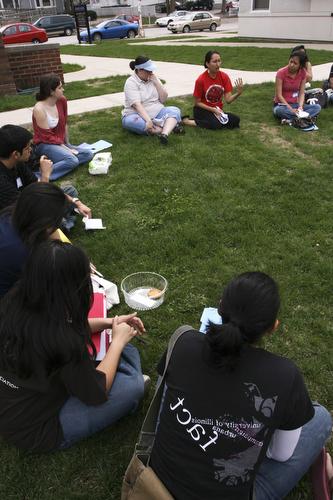Organizations unite to discuss stereotypes

Student leaders on campus have a discussion about Native American Culture outside between the Native American House and the Asian American Cultural Center during the Multicultural Conference on Saturday, Mar. 31, 2007 at the four cultural houses. Beck Diefenbach
Apr 2, 2007
Last updated on May 12, 2016 at 09:18 a.m.
“Tacos and Tequila,” the Chief Illiniwek symbol and other ethnic stereotypes were all addressed during the first Multicultural Conference held March 31 with student leaders and organizations speaking at various cultural houses on campus.
The event was co-sponsored by Together Encouraging the Appreciation of Multiculturalism (TEAM) and the Asian Pacific American Coalition (APAC).
Ajay Alexander, junior in LAS, the external vice president of TEAM and campus outreach chair for APAC, brought the two organizations together to present the opportunity for student leaders and Greek Council leaders to address the theme of the conference: racial stereotyping in the community.
Students at each cultural house at the University rotated during the conference in serving a presentation on the racial stereotypes they face on campus.
Get The Daily Illini in your inbox!
“Each community will be able to compare and contrast how racial stereotypes have affected them,” Alexander said.
Approximately 45 students were present at the conference with the event beginning at the Bruce D. Nesbitt African American Cultural House.
George West, president of the Central Black Student Union and sophomore in LAS, said African-American male students were not permitted to reside in University residence halls until the mid-fifties because there was a fear they would cause trouble. This negative stereotype may still exist today, he added.
Brittany Lacey, executive board member of Women of Color and junior in Communications, said stereotypes are damaging on an individual level as well as on a community level.
“On the educational front, it’s an achievement for anyone to make it to the U of I,” Lacey said. “It’s hard to digest that African- Americans and minorities are considered as less than (able to achieve).”
At the Asian American Cultural Center, the student leaders addressed the model minority stereotype that most Asian Americans face today – the image of Asian Americans succeeding in math and science only because of their ethnicity. Some argued that the model minority myth Asian Americans face is not as negative as other minority stereotypes.
However, some disagree.
“The invisibility within history further perpetuates that we don’t cause trouble, that we’re quiet, we’re invisible, we don’t have a voice, we don’t take action when we’re wronged,” said Carrie Kagawa, co-chair of the Midwest Asian American Students Union and senior in LAS. “That’s very dangerous.”
Molly Springer, member of the Cherokee nation of Oklahoma and assistant director of the Native American House, said the stereotypical isolated image of Native Americans is ingrained in American students. However, Springer said many are attempting to change this image.
The conference ended at the La Casa house where students discussed Latino/a stereotypes, the “Tacos and Tequila” incident and how to educate people on the different cultures.
“In the United States, 20 percent (of people) are Latino; the mainstream media only covers one percent,” said Cristina Revelo, the vice president of Central and South American Student Association and sophomore in Business. “In that one percent, 66 percent is negative coverage of illegal immigration and terrorism.”
In the end, Revelo said the conference was positive. Alexander said the conference was everything he was hoping it would be. He added that because it was a success, the conference will be held in the fall of every year as a kick-off for all student leaders in the cultural community.
“If you hear stereotypes about anyone, the best thing you can do is find out if it’s true,” West said. “This is why a conference like this is so important, so that we can start to break down barriers.”





